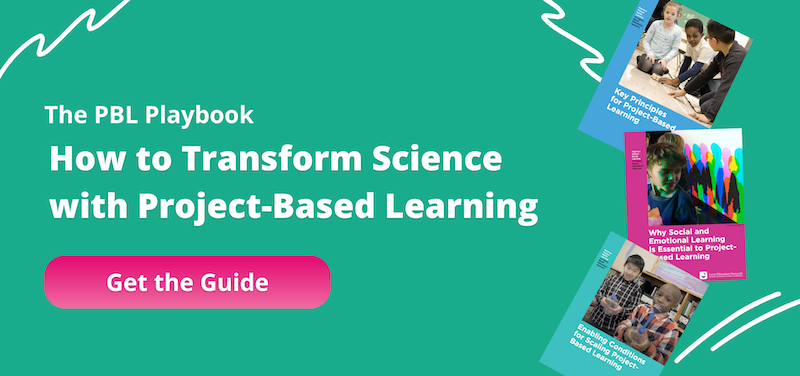In today's rapidly advancing world, science literacy is more important than ever. It empowers students to understand and engage with scientific concepts, think critically, and make informed decisions.
This blog provides practical strategies for integrating science literacy into classrooms at all grade levels, ensuring students develop essential skills in reading, writing, speaking, and listening in science. Read on to learn how to create an engaging and effective science learning environment.

What is science literacy?
Science literacy is using the skills of reading, writing, listening, and speaking to learn and understand science. It includes reading scientific texts, writing about science ideas, and participating in science discussions. These skills help students understand scientific concepts, solve problems, and make informed decisions. In today’s world, being good at STEM is a key part of personal and professional success.
Key Components of Science Literacy
Science literacy has several components that work together to build a comprehensive understanding of science. They include:
- Reading: In the science classroom, reading involves understanding scientific texts, graphs, and data. Students learn to get useful information from scientific materials to help them understand various science topics. This practice builds a strong foundation in scientific vocabulary and ideas.
- Writing: Writing is crucial for science literacy. Students explain their scientific understanding through reports, essays, and lab notes. Writing helps them organize their thoughts and share their findings. It also encourages precision in expressing scientific ideas.
- Speaking and Listening: Discussions, presentations, and debates help students develop speaking and listening skills. Talking about science topics helps clarify understanding and explain the reasoning behind important ideas. Listening to others enhances their comprehension and critical thinking skills. Group discussions and presentations create an interactive learning environment.
- Understanding Scientific Concepts: This means knowing key scientific ideas and how they relate to each other. It also includes recognizing how these concepts apply to everyday life and society.
- Applying Scientific Principles: Students use science principles to analyze situations, make predictions, and solve problems.
- Evaluating Scientific Information: Being scientifically literate means judging the credibility and reliability of scientific information. This skill is vital for making informed decisions based on evidence. Students learn to critically evaluate sources, analyze data, and tell the difference between valid information and pseudoscience.
By integrating literacy into the science classroom, educators can ensure that students are well-prepared to grasp essential scientific principles. This approach helps them effectively apply their knowledge in future studies or careers.
Why is Science Literacy Important?
Science literacy plays an important role in both academic and personal growth for students.
Academic Benefits
With the ever-increasing importance of STEM subjects, science literacy is key to students’ academic growth. When students learn to read, write, speak, and listen in science, they understand and remember scientific concepts better.
Science literacy also builds critical thinking and problem-solving skills. By diving into scientific texts and discussions, students learn to analyze information, weigh evidence, and draw conclusions. These skills are not just reserved for science—they help in all areas of learning and out in the real world.
Personal and Career Growth
In addition to academic impact, science literacy shapes personal development and career readiness. Understanding science helps students make smart decisions in everyday life, like making healthy choices or understanding environmental issues.
For their careers, science literacy is a big plus. Whether students go into STEM fields or other areas, knowing how to understand and communicate scientific information is valuable. This skill set helps them succeed in both college and their future jobs. By being science literate, students are ready for whatever comes next in their academic and professional journeys.
Science Literacy Strategies for All Levels
Science literacy involves understanding how we read, write, speak, and listen in science. These strategies help teachers improve science literacy for all students by focusing on the unique needs of communicating in science.
Reading Strategies
Reading in science is different from reading in other subjects. It involves interpreting data, understanding complex processes, and integrating information from various formats such as graphs, charts, and diagrams. Scientific texts often include specialized vocabulary that students need to understand, which differs from the general reading found in other subjects.
- Incorporate Diverse Texts: Use a variety of scientific texts, including articles, textbooks, and digital resources. This helps students become familiar with different types of scientific writing and perspectives.
- Teach Reading Comprehension Skills: Focus on strategies such as summarizing, questioning, and predicting to improve students’ understanding of scientific texts.
- Vocabulary Building: Emphasize the understanding of specialized scientific vocabulary. Use tools like word walls, flashcards, and vocabulary journals to help students learn and remember new terms.
- Use Graphic Organizers: Tools like Venn diagrams and flowcharts can help students organize scientific information and see connections between concepts.
Writing Strategies
Science writing requires clarity, precision, and a structured approach to presenting data and arguments. It often involves detailed explanations, descriptions of processes, and evidence-based conclusions. Unlike general writing, scientific writing demands the correct use of specialized vocabulary and proper spelling of scientific terms.
- Science Journals: Encourage students to keep science journals where they can record observations, hypotheses, and reflections. This practice promotes regular writing and critical thinking.
- Lab Reports: Teach students how to write structured lab reports that include sections like introduction, methods, results, and conclusion. This helps them organize their scientific findings clearly.
- Peer Review: Incorporate peer review sessions where students critique each other’s work. This not only improves writing skills but also fosters collaboration and communication.
- Use of Specialized Vocabulary: Ensure students use the correct scientific terms in their writing. Provide spelling lists and practice exercises to reinforce correct usage.
Speaking Strategies
When students speak in science class, they need to explain complex concepts clearly and engage in discussions that require evidence-based reasoning. They also need to argue points and present findings effectively, using specialized vocabulary correctly.
- Class Discussions: Facilitate regular class conversations on scientific topics. Encourage students to share their ideas and listen to others, promoting a deeper understanding of the material.
- Presentations: Assign projects where students present their findings to the class. This helps build confidence and improves their ability to explain scientific concepts.
- Debates: Organize debates on scientific issues, allowing students to argue different viewpoints and develop their critical thinking and speaking skills.
- Using Scientific Vocabulary: Encourage students to use proper scientific terminology during discussions and presentations. This reinforces their understanding and correct usage of specialized terms.
Listening Strategies
Listening in science involves understanding detailed explanations, following complex arguments, and integrating auditory information with visual data. Recognizing and understanding specialized vocabulary is also important.
- Active Listening Exercises: Teach students active listening skills, such as making eye contact, nodding, and asking follow-up questions. This can be practiced during class discussions and peer presentations.
- Guest Speakers: Invite scientists or other professionals to speak to the class. Students can practice listening skills and gain insights from experts in the field.
- Educational Videos and Podcasts: Use multimedia resources to present scientific content. Follow up with discussions or quizzes to ensure comprehension and engagement.
- Vocabulary Focus: Encourage students to listen for and note down new scientific terms during lectures or multimedia presentations. Discuss these terms afterward to reinforce understanding.
By using these strategies, teachers of all grades can create a classroom environment that supports science literacy for all students. Developing skills in reading, writing, speaking, and listening in science helps students understand and engage with scientific concepts effectively.
Examples of Science Literacy Strategies for Elementary, Middle, and High School
Different grade levels require tailored approaches to effectively teach science literacy. Here are specific strategies for elementary, middle, and high school students that teachers can easily implement in the classroom.
Elementary School Strategies
- Use Picture Books and Simple Texts (reading strategy): Include a mix of science-themed books alongside fiction and other nonfiction texts in your reading sessions. While reading, encourage students to make predictions (a skill that will later evolve into forming hypotheses) and summarize what they’ve learned.
- Science Journals (writing strategy): Encourage students to keep journals where they can draw and write about their observations and experiments. Introduce the basic structure of scientific writing early by having them use sections like "What I Saw," "What I Thought," and "What I Learned." This practice lays the groundwork for more complex scientific reporting later on.
- Class Discussions (speaking strategy): Facilitate class discussions about simple scientific phenomena, encouraging students to share their ideas. Emphasize the importance of listening to others' viewpoints, asking clarifying questions, and building on each other’s thoughts.
Middle School Strategies
- Identify Key Information and Summarize (reading strategy): Introduce more complex science textbooks and articles. Teach students how to identify key information and summarize it effectively. This helps them distill complex information into understandable concepts.
- Annotating Texts (reading strategy): Encourage students to annotate texts by highlighting important points and writing notes in the margins. This practice helps them engage with the material and retain key concepts.
- Detailed Lab Reports (writing strategy): Teach students to write detailed lab reports that include hypotheses, methods, results, and conclusions. This structured approach helps them understand the scientific method and improve their technical writing skills.
- Research Projects (reading and writing strategy): Assign research projects where students read and analyze scientific literature, then write reports on specific science topics. Ensure they use proper scientific terminology and follow a clear structure, enhancing both their research and writing skills.
- Debates on Scientific Issues (speaking strategy): Organize debates on scientific issues. This helps students develop their argumentation skills, learn to support their viewpoints with evidence, and understand multiple perspectives on a topic.
High School Strategies
- Analyze and Critique Research Papers (reading strategy): Introduce students to primary scientific literature and teach them how to analyze and critique research papers. This helps them understand the structure and rigor of scientific studies and develop critical thinking skills.
- Critical Reading Skills (reading strategy): Focus on critical reading skills, such as evaluating the credibility of sources and understanding complex arguments. This practice enhances students' ability to discern valid information and think analytically.
- Write Scientific Papers (writing strategy): Assign students to write full scientific papers, including abstracts, introductions, methods, results, and discussions. This type of task that requires integration of various information improves learners' technical writing skills and familiarity with scientific reporting.
Impact Of Science Literacy In The Classroom And Beyond
Science literacy is essential for student success in and out of the classroom. By implementing the strategies outlined in this blog, teachers can enhance students' understanding, communication, and application of scientific concepts. These approaches foster critical thinking, build a strong vocabulary, and promote interactive learning. Embrace these strategies to prepare students for future academic and career achievements, ensuring they are well-equipped to navigate and contribute to a science-driven world.





